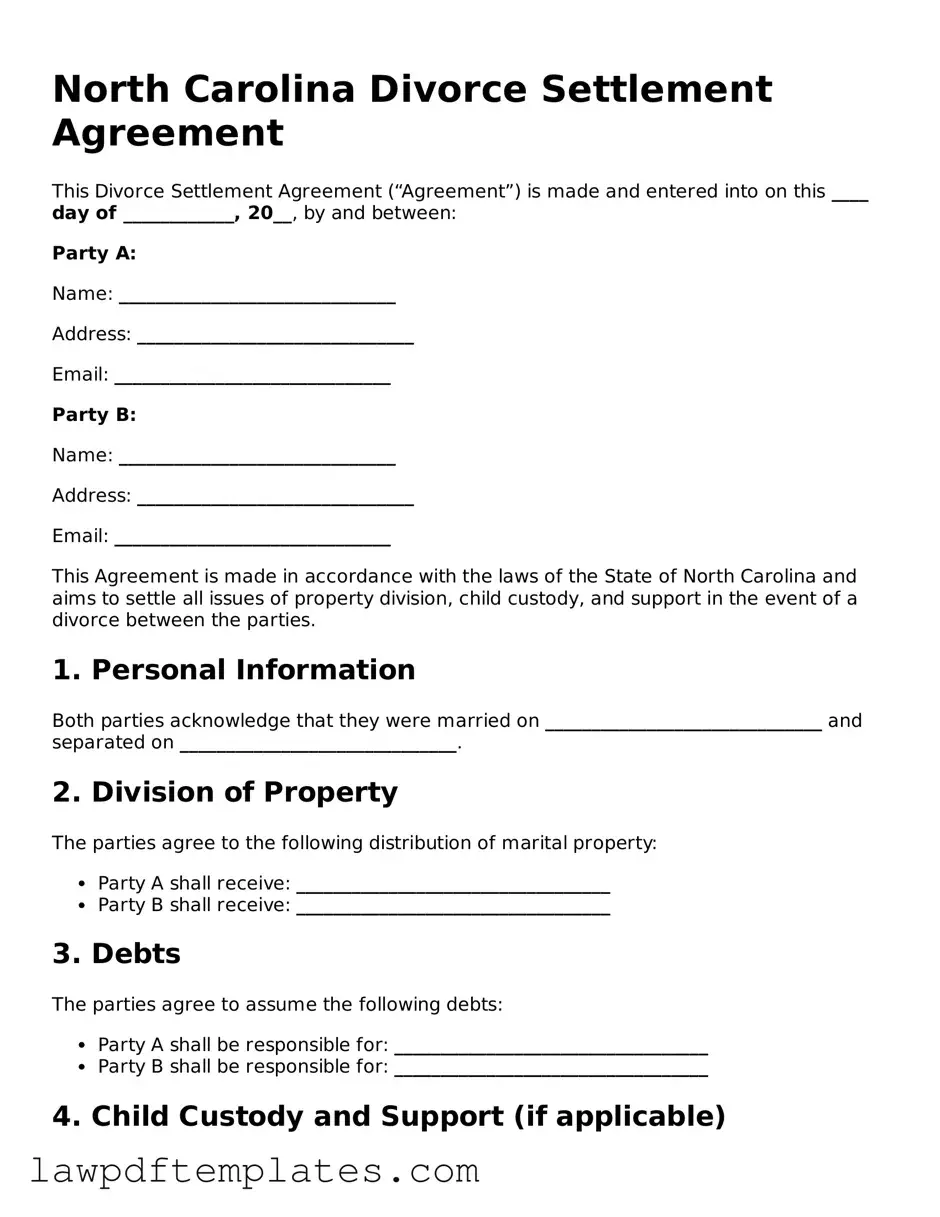Free Divorce Settlement Agreement Template for the State of North Carolina
Form Breakdown
| Fact Name | Description |
|---|---|
| Purpose | The North Carolina Divorce Settlement Agreement form is used to outline the terms of a divorce settlement between spouses, including division of property, alimony, and child custody arrangements. |
| Governing Law | This form is governed by North Carolina General Statutes, specifically Chapter 50, which addresses divorce and family law matters. |
| Filing Requirements | The completed agreement must be filed with the court as part of the divorce proceedings, ensuring that the terms are legally recognized and enforceable. |
| Mutual Consent | Both parties must voluntarily agree to the terms outlined in the settlement agreement, making it essential for effective communication and negotiation during the divorce process. |
Sample - North Carolina Divorce Settlement Agreement Form
North Carolina Divorce Settlement Agreement
This Divorce Settlement Agreement (“Agreement”) is made and entered into on this ____ day of ____________, 20__, by and between:
Party A:
Name: ______________________________
Address: ______________________________
Email: ______________________________
Party B:
Name: ______________________________
Address: ______________________________
Email: ______________________________
This Agreement is made in accordance with the laws of the State of North Carolina and aims to settle all issues of property division, child custody, and support in the event of a divorce between the parties.
1. Personal Information
Both parties acknowledge that they were married on ______________________________ and separated on ______________________________.
2. Division of Property
The parties agree to the following distribution of marital property:
- Party A shall receive: __________________________________
- Party B shall receive: __________________________________
3. Debts
The parties agree to assume the following debts:
- Party A shall be responsible for: __________________________________
- Party B shall be responsible for: __________________________________
4. Child Custody and Support (if applicable)
For any minor children from the marriage, the parties agree to the following:
- Custody Arrangement: ______________________________
- Child Support Payment Amount: ______________________________
- Payment Frequency: ______________________________
5. Additional Provisions
The parties may include any other specific terms that both have agreed upon:
________________________________________________________________________
6. Governing Law
This Agreement shall be governed by and construed in accordance with the laws of the State of North Carolina. Both parties agree to the terms set forth in this document.
7. Signature
IN WITNESS WHEREOF, the parties hereto have executed this Divorce Settlement Agreement as of the day and year first above written.
______________________________ Party A Signature
______________________________ Date
______________________________ Party B Signature
______________________________ Date
Common mistakes
Filling out the North Carolina Divorce Settlement Agreement form can be a daunting task, and many individuals make mistakes that can lead to complications down the line. One common error is failing to provide complete information. Every section of the form must be filled out accurately. Omitting details, such as income or asset values, can create misunderstandings and may delay the divorce process.
Another frequent mistake is not being specific enough about the terms of the agreement. For instance, vague language regarding child custody or support can lead to disputes later. It’s crucial to clearly outline responsibilities and expectations. This clarity helps both parties understand their obligations and can prevent future conflicts.
People often overlook the importance of reviewing the form before submission. Double-checking for typos or inaccuracies is essential. Errors may not only affect the agreement’s validity but could also complicate the court’s understanding of the situation. Taking the time to review can save a lot of hassle later on.
Additionally, many individuals forget to consider the tax implications of their agreements. For example, the division of assets and alimony can have significant tax consequences. Understanding these implications can help individuals make informed decisions that benefit their financial future.
Lastly, neglecting to seek professional advice is a mistake that can have lasting effects. While it might seem tempting to handle everything independently, consulting with a legal professional can provide clarity and ensure that the agreement is fair and comprehensive. This step can be crucial in protecting one’s rights and interests during the divorce process.
Discover More Divorce Settlement Agreement Templates for Specific States
Massachusetts Separation Agreement Template - The agreement addresses child custody and parenting time arrangements.
In addition to providing essential information about the vehicle's condition and purchase price, the Texas RV Bill of Sale can be conveniently accessed and filled out online through resources like PDF Documents Hub, making the transaction process smoother for both buyers and sellers.
Marital Settlement Agreement in Arizona - Each spouse should carefully review the terms before signing.
Marital Settlement Agreement California - This agreement can include stipulations about debt responsibility.
Settlement Conference Divorce Michigan - The agreement includes provisions for the division of marital property.
